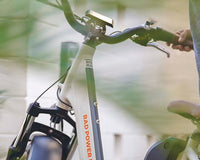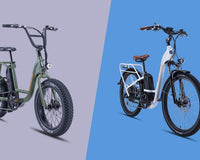The door closes behind me, immediately it's clear that it isn’t summer anymore. It’s a colder morning, but nothing a jacket and gloves can’t manage. Taking a second to toggle my ebike lights and motor, I check my phone for the time - 7:45 a.m. The travel estimate for driving says 25 minutes for my normal commute. I’m running a bit late. I set the pedal assist level straight to 5 and take off.
Quickly, I am gaining speed down the hill. Stop sign up ahead, tapping the brakes to come to a stop, I check the intersection traffic and it’s completely blocked, no gaps in the traffic lane, no one is moving. Great... I mount back on and roll into the bike lane, turning right onto the traffic-blocked street. Traffic is an awful mess of brake lights and frustration but the bike lane is totally clear all the way to work. I roll the bike into the bike stand at the office, taking my helmet off, I check the time again - 8:03 a.m. Early, and with time to spare.
I’ve been riding bikes as long as I can remember, but the constant struggle for me has been integrating my love for cycling into my commute. The major hindrance for me as a bike commuter is the choice of whether to get on a bike in the morning or get in the car. When push comes to shove, it is just plain easier to get in the car rather than take the bike. There are all sorts of excuses that have run through my head and maybe some of these are familiar:
“It takes a lot less effort to drive than bike.”
“It is way too cold or rainy to bike, a car will be much more comfortable.”
“It will take too much time, I can get there so much faster by car.”
“When I get to work, I need to look professional, not like I just hit the gym.”
These excuses were some of the most common I caught myself saying. But in the end it was not my own will that pushed the change, to be honest. It was the realization of cost and financial burden associated. As a Seattle resident with rent to pay, tuition payments due, monthly transportation expenses, let alone saving for my future, and costs to own a car in the thousands of dollars, this was a bit of a wake-up call. Looking specifically at the numbers was the best way to really see where I was at.
The numbers below are fairly similar to my real-life expenses, but some numbers defer instead to national averages to provide a wider scope of detail:
| Yr-1 Cost | Yr-2 Cost | Yr-3 Cost | Yr-4 Cost | |
| Car Purchase | $6,200 | |||
| Insurance | $750 | $750 | $750 | $750 |
| Gas** | $2,191 | $2,191 | $2,191 | $2,191 |
| Maintenance & Repair*** | $675 | $850 | $1,000 | $1,500 |
| Yearly Estimated Total | $9,816 | $3,836 | $3,941 | $4,441 |
| Monthly Breakdown | $818.00 | $319.67 | $328.42 | $370.08 |
*Values based on used mid-2000's 4-door sedan
**Estimated using 2016-2018 price per gallon average
***Budgeted amounts for regular/suggested maintenance and common issues & repairs
Purchasing a used car to use for commuting purposes cost me about $6,200, insurance for myself to drive the car cost me $750 for the year, the average tank of gas was $42 for a week's worth of travel - $2,191 for a full year based on that average and then maintenance, parts, and repair costs came out to about $675 a year with following years expected to have raised costs.
Just from a financial perspective, owning, maintaining, and using a car for the sole purpose of commuting was something that was just not feasible for me and it really pushed me to change the way I commute. Having been a cyclist all of my life and past experience commuting by bike, switching to bike and ebike commuting seemed the natural choice. The financial burdens are much lower, and on top of that, there are some great benefits that go beyond just the finances. If you have never ridden a bike to work before, there are some great benefits that come along with full time bike commuting. If you have, these may be a few things you have already experienced.
- It is a great way to enjoy a bit of your morning and evening.
- Skip the traffic and save the stress.
- Take the long way home and explore your neighborhood and city.
- Biking is a low impact exercise that helps burn calories if you are looking to cut back.
- Other health benefits of cycling are better cardiovascular health, muscle growth, and improved coordination.
- Daily exercise has been shown to benefit a rider’s psychological health.
The amazing thing is, the benefits of riding an electric bike for commuting go even further than that! The benefits of riding an electric bike begin to even counteract the reasons why commuting by bike would be an unpleasant option.
- You can arrive at work ready for work and not looking like you just did an hour of cardio.
- You get the healthier lifestyle without the time commitment of getting ready twice and getting cleaned up again.
- You can move quite a bit quicker than a standard bike, cutting down on the time required to get to work.
Of course, there is also the potential for financial savings:
| Yr-1 Cost | Yr-2 Cost | Yr-3 Cost | Yr-4 Cost | |
| Ebike Cost | $1,499 | |||
| Bike Locks | $100 | |||
| Helmet | $80 | |||
| Pannier Bags | $178 | |||
| Rain Gear | $250 | |||
| Bike Pump | $50 | |||
| Replacement Battery** | $550 | |||
| Maintenance & Repair | $250 | $250 | $250 | $250 |
| Totals | $2,407 | $250 | $800 | $250 |
| Monthly Breakdown | $200.58 | $20.84 | $66.67 | $20.84 |
*20 mile round trip - based on ~5200 commuter miles/year
**2018 Batteries are rated for 800 full charge cycles, replacement is based on 1 full cycle per day
***Actual replacement schedule may vary based on conditions, mileage, and use
For a fair comparison for the numbers, I had to lay out the costs for what I would need to effectively commute to and from work every day. There was the bike itself, a helmet, a couple of bags, rain gear, cold weather gear, a pair of shoes to bike in, some spare tubes and parts, a couple good locks to keep everything safe, and some supplemental tools for quick roadside repairs. Being familiar with bikes, I do not visit bike mechanics too often, normally just resolving problems myself. Major things I will take to a mechanic though, which is accounted for in the maintenance and repair costs.
A couple of notes. Of course, with any vehicle, there is some maintenance, repair, and parts required to keep everything running in tip-top shape. For my ebike commuting, I follow a general maintenance schedule for my ebike, keeping track of my brakes, tires, tubes, cables, and the general wear and tear to keep my travel safe. Less money can be spent on entry to bike commuting as not all items above need to be purchased. Everyone commutes with a different set up and uses different combinations of gear to suit their needs and means. These are just the choices I went with, not requirements by any means.
| Commute by Car | Commute by Ebike | Ebike Savings* | |
| Year 1 | $9,816 | $2,407 | $7,409 |
| Year 2 | $3,836 | $250 | $3,541 |
| Year 3 | $3,941 | $800 | $3,141 |
| Year 4 | $4,441 | $250 | $4,191 |
| Total Estimated after 4 years | $22,034 | $3,707 | $17,927 |
*Savings are calculated based on data listed above
The savings that are possible by switching to an ebike can fall in the thousands of dollars, but on top of that there are the benefits that cannot be measured in dollar signs; the hours spent sitting in traffic, the weight that can be lost just by traveling to and from your job, the general benefits of a healthier lifestyle, the pollution cut from your daily drive, and many bike and ebike commuters report better productivity levels.
I have been commuting to work by bike for three years now, switching most recently to my ebike. Throughout my life, I have given up on commuting by bike multiple times because of convenience. An ebike has altered that perspective for me, not just for my commutes, but for errands, shopping trips, and I bring it with me on longer trips. On top of that, I sold my car.
Please note, the data listed above is from the experience of one person. Your figures will vary depending on your specific use case.








